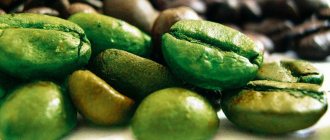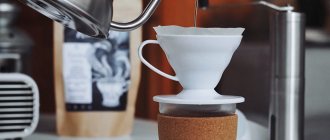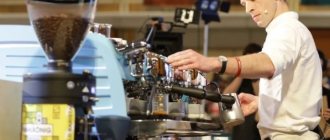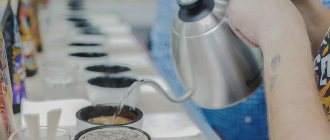Many people cannot imagine the morning without a cup of coffee. But to enjoy the aromatic drink, you need to prepare it correctly. After all, making coffee is an art. To become a professional in this field, you need to master the profession of a barista - a person who is capable of creating coffee masterpieces. We will tell you how to become a barista .
Hello my dear comrade!
You are looking for a job and want to become a real cool barista.
The idea is great - this is a very interesting profession that is fraught with real romance, but it is worth remembering that working as a barista is quite difficult. Working as a barista is a full-time profession that requires both mechanical skills and knowledge in the field of coffee, geography, a little physics and chemistry. But the most difficult thing about being a great barista is the ability to communicate with people. Sometimes your salary will directly depend on this skill. Just don’t say work as a barista, this word is not inclined in Russian =)
How to become a barista yourself
If you are not sure whether a training course is right for you, you can study on your own. However, this approach requires a lot of dedication. Firstly, you need to gain theoretical knowledge. To do this, read industry articles and blogs, and browse websites dedicated to the art of coffee making. It may also be useful to follow related YouTube channels. Free movies available there will reveal the secrets of drinks such as espresso, cappuccino or latte.
Don't forget that the most important thing is practice. Focus on consistent training. To do this you will need suitable equipment. It comes with more than just a coffee grinder or coffee maker. For a more professional approach, consider purchasing special accessories, such as a milk frothing jug, an espresso coffee tamper, a coffee bean grinder, or a latte art marker that can be used to create the famous intricate patterns on the surface of the drink. . You will get a latte art master class from the video.
If you already have basic skills, you can start looking for a job. Remember that even beginners have chances. Many employers look favorably on candidates who show enthusiasm and a desire to learn. In this situation, a barista with no experience can often rely on training as well as support from senior management and other team members. So if you feel like coffee is your true passion, take a chance and submit your resume, even if you haven't worked in the field before.
Let's start in order.
The job of a barista is very interesting and includes:
- continuous training in the skill - interesting equipment that gets smarter and cooler every year - participation in championships - leveling up in latte art - constant search for new tastes and combinations - continuous development of your receptors - training new baristas - a huge amount of communication with new and interesting people people - in the end, you can start your own barista blog (by the way, if you have something to talk about, write here) Anyone who comes into the profession will be able to find a niche of interest.
The job of a barista is somewhat similar to the job of a sommelier.
Having reached a certain level of skill, the barista begins to choose his own coffee shops =)
Every year there are more and more decent coffee shops, and this is an excellent opportunity for development. If you know how to brew coffee, you can easily find a job in any more or less large city in the country, and beyond (there will be a separate post about the specifics of working as a barista abroad). You need to understand that a barista must be cool, must be able to adjust espresso on the fly, have good latte art, be able to communicate with people, speaking a foreign language will be a huge plus.
Having mastered the skills of a barista and feeling the strength in yourself, you can move on: - you can become a chef barista - become a coach and teach young students - go into roasting - go into judging - open your own establishment - become a fashion blogger In general, there are many areas of application of your skills
And a special bonus is a unique community, which is just emerging in our country, but is becoming larger every year.
How to build a career
A career in this direction is possible mainly in the horizontal plane. By increasing the level of professionalism, the barista gets the opportunity to apply for employment in more prestigious places. Representatives of the profession have universal skills, so if you wish, you can try to get a job in Europe, the USA, Canada, and Australia. The latter recorded the highest hourly rate for remuneration of employees of this profile (about 3 thousand rubles).
Vertical career growth involves obtaining an administrative position or the post of master taster. Another option is to start your own business.
There are many advantages, but what about the disadvantages?
And, perhaps, the main disadvantage is the high physical and psychological stress. The barista has to stand on her feet 5 days a week for 8-12 hours, sometimes carrying really heavy boxes of coffee, milk, and water bottles. Although a barista is not a loader, sometimes you will have to lift weights, and this cannot be avoided.
The second disadvantage is communication with people. You need to communicate in a positive way and a lot. If the mood is not set, your hands are feeling tired, the barista should still be polite and smiling. In our culture, unlike the American one, there are no such skills and they will have to be developed. A large flow of orders is a colossal psychological burden; if you don’t know how to pull yourself together and “walk around” without interruption for a couple of hours without being able to go to the toilet, then perhaps you shouldn’t become a barista.
We will not consider the story with the employer, and it is clear that a lot depends on whether the owner of the establishment took care of his employees and guests, we will discuss this topic some other time, the topic is very broad and there is something to talk about .
Barista courses
A very good way to start a career as a cafe employee is to take courses. Their prices vary (from one to ten thousand rubles). This greatly depends on the length of the program. Such programs will help you answer the question of how to become a barista. In addition, they allow you to easily study while working. All classes are usually held on weekends.
Barista courses include theory and practice. During theoretical classes they tell a lot of interesting things about the history of coffee, its varieties, and methods of preparation. Technical details are also taught in these courses. And this is the device and operating principle of coffee machines and coffee grinders.
During the practical part of the class, under the guidance of a professional, you will prepare and taste different types of delicious coffee drinks. It is very important that during such practice they will point out mistakes to you and tell you how to avoid them next time. You can calculate the correct proportions of water and ground coffee beans using a coffee calculator. When you complete your training, you will need to pass exams in theory and practice. After this you will receive a barista certificate.
So what do you need to know to brew coffee?
“It’s bullshit, grind the grain, stick it in the coffee machine and press the button” - this is a very common opinion, sometimes even among people who brew coffee. A similar vision is found even in decent restaurants and bars. On the one hand, it’s hard to argue; when looking from the audience, the thought may creep in that the barista is not doing anything particularly complicated: he stands, grinds espresso, inserts the holder into the machine and presses a button, that’s nonsense! But there are nuances... For starters. Making coffee is a skill that needs to be developed long and hard. Just like putting a shot in tennis or boxing. Before you can produce stable and high-quality results time after time, you will have to practice and strain a little. On average, it takes a person 3-6 months to acquire an average skill, provided that the future barista does everything consciously and with an eye to results. Learning is always a conscious approach. Otherwise, you can waste a lot of time without achieving anything.
Besides mechanics. The mechanics are quickly and easily hammered into the muscles. In addition to this, you need to learn to distinguish what is tasty and of high quality and what is not. And this is the most difficult thing in the profession.
To understand the taste of coffee, you need to drink a lot of it, oddly enough, and not just any kind of coffee, you need to drink good coffee. Everything is like in the world of wine, you can have a good drink every evening, but this will not give you the skills of a sommelier =)
Every more or less large city has decent coffee shops with good equipment and experienced baristas.
A very good habit would be to go to new good coffee shops, try espresso, cappuccino, flat white and politely ask the locals what kind of bean, what kind of processing, what settings and why. The most important thing is to be ethical and polite. Next stage.
You will have to learn geography, know in which countries what kind of coffee is produced, how Ethiopia differs from Kenya, how Africa differs from America.
There are many farms and farmers in one country, and each of them is experimenting with production and processing.
What is the difference between natural and anaerobic?
Why is fermentation with various bacteria needed? What are grain defects and what do they affect? About level.
And then magic generally sets in; you’ll have to improve your chemistry and physics. This will be needed to understand what happens during extraction, what extraction is, how different roasts differ, etc.
You can go deeper indefinitely...
You will have to put this entire body of knowledge on your hard drive and be able to use it all.
Who is a barista and what does he do?
So, a barista is a coffee maker, that is, a specialist who knows how to prepare various coffee-based drinks
. For some reason, the Russian-language name for this profession did not catch on in everyday life (most likely due to its consonance with a coffee maker).
One way or another, this word comes from the Italian “barista”, meaning a worker serving customers at the bar. Because of this, a barista is often confused with a bartender, although the only thing they have in common is that they both prepare drinks. The first brews exclusively coffee, and the second works with alcohol.
The confusion arose largely due to the fact that for a long time there simply was no such profession in Russia. When the need arose, the duties of a barista in catering establishments were performed by a barmaid.
Photo source: Quang Nguyen Vinh/pexels
Espresso setting.
Customize espresso?
Yes, that's exactly what it's called.
You can take the coolest, most expensive and high-quality coffee, the most advanced coffee machine, select the ideal water, but everything will be in vain if the barista cannot adjust the espresso. The output will be oil. So what does it mean to customize your espresso?
Setting is the selection of optimal parameters: extraction time, grinding, temperature, pressure, preparation technique, volume of the finished drink, and all this online. There's a lot more to customization than determining which coffee grind to use.
The setting process begins as soon as the barista gets up to the coffee machine and ends when... but it doesn’t end) A good barista adjusts the espresso all the time. Throughout your shift you must constantly monitor what is happening with the coffee. If something goes wrong, you must immediately take prompt action to correct it.
A professional eye is trained to see the slightest changes and quickly decide whether to use this coffee alone, or whether it is better to remake the drink.
Latte art.
This is an integral part of the profession! Everyone understands perfectly well that the main thing is taste, but between a cappuccino with a neat design and a cappuccino with a spot, everyone will choose the design first. Plus, if a barista can't draw, then he probably can't froth milk. Well-frothed milk at the right temperature is the key to a good milk drink, so basic latte art is a must.
We'll talk about customization and drawings in other articles.
Purity! The first thing you need after knowing how to brew coffee is maintaining cleanliness and keeping it everywhere.
The barista’s work area is a sterile zone, you can even eat from the field here! All items are strictly in their places, even if it’s busy, even if God knows what’s going on around, the barista area is an example of discipline, order and cleanliness. Equipment is something that needs to be protected, loved and respected. The coffee machine and coffee grinder should be washed daily. At the end of every working day, everything must be completely disassembled and cleaned using special products, and this is not discussed, every day!
Requirements for a barista when hiring
When hired, a barite must be able to demonstrate his skills, namely:
- have aesthetic and artistic abilities;
- be able to make various combinations of available coffee varieties;
- have at least 40 recipes for preparing the drink, including classic options: cappuccino, espresso, Americano;
- pay attention to the equipment: put it into operation, clean it, do preventive maintenance;
- be able to work in ambiguity mode - during working hours, the barista focuses on the pressure of the coffee machine, water temperature, safety of fillers, degree of grinding, readiness of all coffee options;
- be sociable and friendly, since tips are an important factor.
For you:
Self-service coffee shop franchises: a comparative review
Let's summarize briefly.
Working as a barista is interesting, you can make good money, there are many ways to develop and realize yourself, it all depends on your desires and aspirations. As with any profession, there are pros and cons.
The main thing you need to understand is that a barista is the same job as any other profession and she will have to learn, develop and try. The profession of a barista is an interesting profession, and the experience of working as a barista is a unique experience!
Barista, barista work, article
11.10.2020
Coffee Recipes
The most popular recipes for espresso and drinks based on it, used correctly by baristas, will bring you pleasure.
- Espresso, steamed from high-quality ground and roasted beans, is the basis of many coffee cocktails. It is prepared using coffee machines, but can also be brewed in a Turkish coffee pot. This brewing method improves the extraction of nutrients and caffeine.
- Ristretto is the strongest and richest coffee drink, which contains one hundred percent coffee and half water, and will ideally invigorate you. Recommended for afternoon tea.
In Mexico, you will definitely be offered cinnamon and sugar with Ristretto as an addition to wonderful coffee.
- Brewed in Turkish style, poured through a sieve and brewed again - an extraordinary recipe for Insomnia.
- A vigorous mixture of Turkish coffee, which is repeatedly poured through a sieve containing fresh ground beans, is called Black Insomnia.
- Magnificent Frank - coffee is prepared in a coffee maker with a strainer. Raw materials are placed on it, which is filtered through a mesh after pouring boiling water. To brew, you need about twenty grams of coarsely ground coffee and a glass of boiling water. Sugar is added at the request of the client, based on his tastes.
- In the morning you will be served a drink with milk in many countries. The delicious drink will be accompanied by delicious toast with jam, croissants and muesli. This kind of breakfast is the hallmark of France and Switzerland. There is no point in refusing.
- The incredible aroma of coffee in equal proportions with whipped hot milk was invented by Italian Capuchin monks. Since then the world has been enjoying Cappuccino. The ideal drink consists of espresso, heated milk (heated by steam), and milk foam, with an equal amount of each ingredient (⅓ each).
The difference between White and Black Cappuccino is that the black contains only coffee and foam.
- Macciatto is a strong coffee served in small portions. Snow-white foam obtained from whipped milk with sugar is added to it. Unique taste.
- The strength of rich espresso combined with delicate whipped cream is Espresso Con Panel. Pleasant + useful – these are the reviews about the drink.
- A tasty and beautiful Marble drink is easy to prepare. A little warm milk is literally dripped into the bottom of the cup. Pour hot black coffee without stirring. This way the image of marble is preserved.
- Pour condensed milk (no more than two teaspoons) into the bottom of a glass bowl, carefully pour in freshly prepared black coffee, but do not stir. Pour in coffee liqueur to taste and desire, add a small lemon peel. Mix and enjoy the amazing taste. According to tasters, baraquito coffee not only gives incredible vigor, but also evokes the same desires.
- Australian spiced coffee is useful before making serious and responsible decisions. It's a great combination of espresso coffee, spices (cloves are preferred) and citrus zest.
- Let the syrup boil in the Turk. Pour a small part of it into a cup. Fill the remaining liquid with coffee and brew. Mix both parts, cover, leave for about thirty seconds. Serbian coffee is ready.
- Delicate French coffee cream is a luxurious composition of strong drink, cream and milk. Bring half a liter of the last product mixed with sugar (150 grams) to a boil. Remove from heat, add cream (four tablespoons). Whisk everything, adding a quarter liter of fairly strong coffee. Mix all ingredients.
Duration and features of training
To gain basic knowledge about coffee and practical skills in handling equipment, 2-7 days are enough. More in-depth training will take 10-15 days. In general, of course, the period depends on the level of the coach. At the end of the course, not every barista will become a first-class specialist; it is impossible to achieve such a goal in such a short time. I think it won’t be easy to achieve this even in a month. But students will definitely receive an understanding of the subject and effective tools for further development of skills in the chosen direction. And then the main thing is practice, practice and more practice!
Why is everything like this? A concentrated program allows you to gain knowledge without taking too long a break from work. This is convenient for business owners. Another significant advantage is that you can choose in which block and at what level you want to study. For example, for a barista who wants to grow into a chef, the following set will be relevant: “Barista skills” and “Brewing” up to the “Professional” level, necessarily “Sensory skills” up to the “Intermediate” level, the basics of “Roasting” and “Green coffee” . For a coffee lover - “Introduction to coffee”, “Brewing” and “Sensory skills” at the “Fundamentals” level. A coffee business owner can take “Introduction to coffee” and “Sensory skills” up to the “Intermediate” level, as well as modules that are relevant to his project.
Based on the experience of the Barista Academy, we can say that learning professional skills seriously is not easy work. Of the 20 students in the course, less than half reach the end. The combination of concentrated theoretical and practical work requires complete dedication. During the classes, students learn all kinds of drink preparation techniques, work with different types of coffee machines, get acquainted with cupping methodology, and understand the basic concepts of sensory analysis. Great attention is paid to practice, so it is impossible to do without a properly equipped site.
Features of the profession
The barista prepares both natural coffee from beans and drinks based on it (for example, ristretto, cappuccino, latte, Americano, various cocktails, etc.).
Literally translated from Italian, the word “barista” means “bartender.” Indeed, at first, baristas were people who combined the duties of bartenders and coffee machine operators preparing espresso. But thanks to the popularity of coffee, baristas gradually appeared who specialized exclusively in preparing espresso and its derivatives (lattes, cappuccinos and other coffee drinks).
Italians hold this profession in special esteem, so true virtuosos of their craft devote their entire lives to studying the history of coffee and know all the intricacies of methods for collecting and processing its beans. Entire family clans of Italian baristas are known. When a barista achieves the best results in the field of espresso, he can classify himself as a “master barista.”
There are six main methods of brewing coffee: pouring, steeping, filtering, drip, and pressure brewing. Espresso is obtained by brewing under pressure; this drink is the main one on the menu of all coffee shops in the city and most restaurants, cafes, and bars.
Each coffee blend is prepared in a different way to achieve the best coffee flavor. The quality of espresso can be affected by the freshness of the coffee, grind, water hardness, machine parameters and its operation. A barista knows how to determine the quality of a drink based on taste and eliminate the causes of its shortcomings. As a rule, the quality of coffee is determined by taste, aftertaste (the taste sensations after a sip remain for a long time), aroma and color of the drink.
According to experts, when espresso is prepared according to all the rules, it has a non-settling golden creamy foam on its surface, known as “cremanta”, as the Italians call it.
What are the prospects for graduates?
Students who successfully complete the SCA Coffee Skills Program have the opportunity to take the SCA Diploma exam, an international certificate of coffee education. Then they can decide in which direction they are interested in continuing their development: working as a chef barista, opening their own coffee shop, participating in championships, doing roasting or consulting in the coffee business. In addition, there is another well-structured training system for specialists in the coffee industry - the Q-grader program at the Coffee Quality Institute.
Q-grading is a unified system for assessing the quality of green coffee, which was developed by CQI. Q graders decide how many points out of one hundred a particular grain sample will receive. For example, for coffee to receive a specialty class, it must score more than 80 points. The program includes 4 days of intensive training and a fairly tough exam. The theory covers knowledge of green coffee, roasting and sensory evaluation and assumes that the student has a decent background in working with coffee. It is clear that an ordinary barista or a novice coffee lover is unlikely to need such training.
How the Coffee Skills Program from SCA is created
So far, there is only one barista training program worth considering - the Coffee Skills Program from SCA. This is a global training standard covering five areas of coffee knowledge: working with green coffee (Green coffee), coffee roasting (Roasting), professional tasting (Sensory skills), brewing black coffee (Brewing) and working with the espresso method in a coffee shop (Barista skills). . The development of curricula and examinations is carried out by authorized committees and the SCA education department, which involve industry professionals who have confirmed their qualifications.
Based on these curricula, SCA Authorized Trainers (ASTs) write training programs and build lesson plans. Therefore, the general theoretical framework is the same for everyone. Quite strict conditions for the organization and material support of the training space are prescribed for coaches. But what makes this system unique is the personal experience of the trainer in the area in which he specializes, and the opportunity for program students to choose any teacher anywhere in the world. The uniform online schedule can be easily found on the SCA website. The program is well structured and balanced in terms of knowledge.
The five main training modules have three levels: “Basics”, “Intermediate” and “Professional”. A student can come to “Basics” without any experience working with coffee and gain basic knowledge and skills to work in the chosen direction. The “intermediate” level requires at least 6 months of experience in the field and uses an expanded theoretical framework and advanced techniques. The name “Professional” speaks for itself: the intensity of the classes is very high, the modules last from 1 to 3 days.
Interview at Skuratov coffee
Viktor Skuratov is an entrepreneur from Omsk; at the time of writing, he opened 19 coffee shops in Russia. One of the establishments is located in the center of Nizhny Novgorod. The coffee shop positions itself as a brew bar.
A few days before the interview, I went to investigate...and the coffee shop is really cool. The staff there is extremely polite, I don’t even remember anyone talking to me like that in my entire life. They greet you loudly from the door, smile sincerely and thank you for every action. And this atmosphere is transmitted to all visitors to the coffee shop: people wish each other a bon appetit and to be healthy. After traveling in a minibus it’s completely unusual.
And there they write the name and name of the drink on the glass in beautiful handwriting. Perhaps under the influence of emotional ecstasy, but I also liked the coffee. Despite the rather high prices (170 rubles for a small cappuccino), visitors come almost without interruption.
Before applying for a six-month contract, you must complete a two-month internship with training. The internship pays 100 rubles per hour.
Now comes the interview, which is called an “interview.” They give you a glass of coffee and you need to communicate with 3 people in succession. In my case, these were the manager - Victor (only Victors), Artem and Nadezhda. Besides me, there were at least three more contenders. The questions were tricky, 70% unrelated to work in principle. For example: “what tree do you associate yourself with”, “what is the fundamental difference between coffee and laundry”, “which celebrity would you like to resurrect in order to communicate.” Despite the difficult questions, I enjoyed the interview, as all three people were personable.
But it would be really strange if, having not been accepted into Coffee Like, I would have been accepted into Skuratov. An answer came to the mail with the approximate content: “our choice defies logic, you are not suitable for us because you do not fit the atmosphere.” In any case, I will sometimes go there for coffee.










